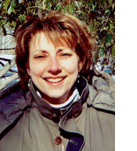|
MIND
Second Chances
Using Journaling to Find Our Uniqueness
by Marian Buckner, RN, BSN

The Grace to Let Go
As we wave our children on to college, new jobs, and new relationships, our words of encouragement support them in their adventures. Since our babies first crawled, a major part of parenting was having the grace to let them go. Still, we were there, ready to pick them up, give hugs and kisses, then cheer them onward to try again.
As parents, we taught them to get up and start over, all on their own, confident that they are loved and cherished unconditionally. This was our gift to them. Independence is an invaluable lesson and key to a self-determined life. We praise their courage and wave them on with one hand. We hold the other hand behind our back, with fingers crossed.
A Sense of Loss
As parents, we dream of the time when our lives will be our own again: a beacon of hope during the trials of infancy, childhood, and adolescence. Now the time has come, and the loss we feel is vast. It has no clear-cut depth or boundary. The emptiness is comparable to how much we identified ourselves as a "parent"—often described as the most important job a human being can have.
The energy we have expended, from the time we conceive a baby to the time that young adult leaves home, is unimaginable. But, we give it with the intent that our child will recognize, appreciate, and develop their uniqueness as they grow.
A New Restlessness
That support we so freely gave for such a large portion of our adult life has a downside. All that time, we often placed our own uniqueness on the back burner. Self-sacrifice is a significant component of the emptiness we feel when our children leave the nest. Although we do not doubt that our choices were necessary at the time, we are now faced with a new dilemma: We have more time on our hands and less to do. Less that we really need to do.
An irritable, undefined restlessness invades our world. If we fail to address this passage into a new phase our life, we suffer the consequences: insomnia, depression, weight gain, increased stress with our partners. On top of that, our hearts plainly miss the children we gave birth to and nurtured all these years. There is a deep sorrow inherent in our babies leaving home.
Second Chances
How do we deal with this new period of our lives? We encouraged our children to strive toward new goals. So now, we must remember those lessons and find our own uniqueness. This is a time of second chances: We have the time and energy to devote to our own dreams and aspirations. Add to the mix the wisdom we attained from our life experiences, and the likelihood of reaching a dream becomes more authentic. We are quicker to deduce what will work and what won’t, what risk is worth taking.
The truth is, we have to know what it is we want. It may have been years since we’ve had the luxury to concentrate solely on our own yearnings. For some, the journey is easy, and they embrace this change with enthusiasm. Others struggle to recognize who they are beyond "parent"—now a non-operational label, or an honorific, at best.
Write It Down
Any new stage in life deserves reflection. It helps to write down our thoughts. The act of committing to paper our own joys, wishes, and passions makes them more compelling, particularly if we are out of practice. It is self-affirming to acknowledge what we enjoy as an individual, for there is no one in this world with the exact likes and loves that each of us has as an individual.
Begin with what you know about yourself: hobbies, what delights you, your volunteer work, the articles you save from magazines, how you spend your
"free time." Think back to your childhood and what gave you satisfaction. As you develop your list, you will, in time, recognize, appreciate, and develop your own uniqueness. From that starting point, what you decide to do becomes your own adventure.
For more on journaling:
Inspired to Journal
Free Your Spirit with the Written Word
 Marian Buckner, RN, BSN, specializes in psychiatric nursing. During her 28-year career, she has worked with patients in a variety of inpatient and outpatient settings. She lives in rural Pennsylvania, where she is in the process of emptying her nest and at the same time discovering her own uniqueness.
Marian Buckner, RN, BSN, specializes in psychiatric nursing. During her 28-year career, she has worked with patients in a variety of inpatient and outpatient settings. She lives in rural Pennsylvania, where she is in the process of emptying her nest and at the same time discovering her own uniqueness.
|

